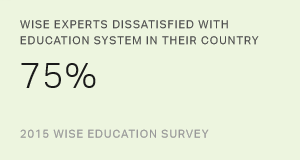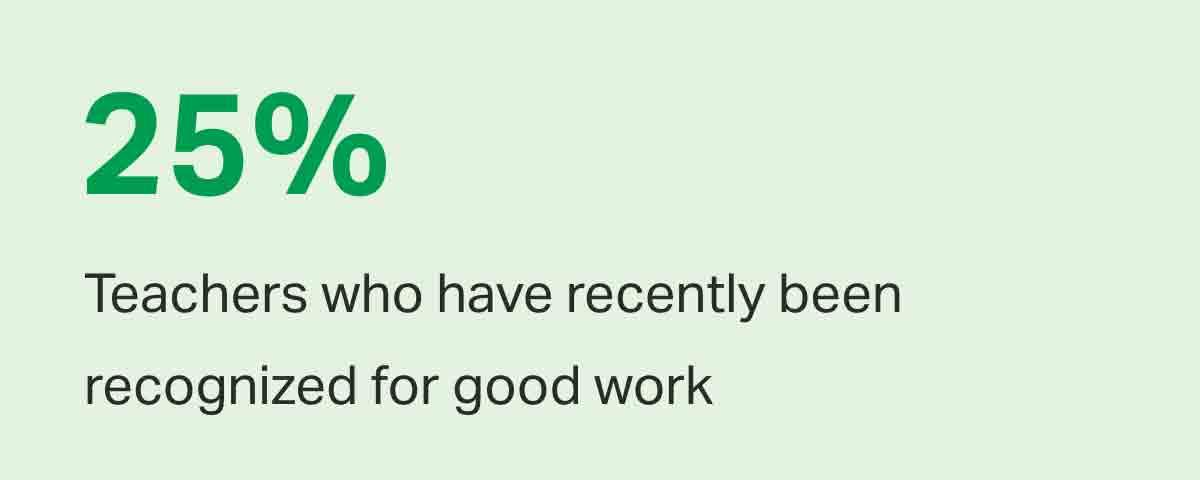The World Innovation Summit for Education (WISE) is a global education conference focused on promoting practical ideas for raising the level of education worldwide. This year's conference is in Doha, Qatar, Nov. 3-5, with U.S. first lady Michelle Obama delivering a special address on the first day. The findings from Gallup's recent Web survey for WISE will serve as a springboard for discussions at the conference.
The reflects the views of 1,550 members of the WISE global community. These are teachers, students, recent graduates, education policymakers and members of the private sector in 149 countries who have attended WISE conferences in the past or have connected with WISE in other ways. While the survey does not represent the views of any broader educational populations or organizations in the U.S. or globally, it may reflect the general outlook at the WISE conference this week as participants explore creative solutions to several vexing educational challenges.
The survey offers sobering assessments of the global educational status quo along with some encouraging consensus on a number of potential solutions.
On the sobering side, three-quarters of WISE respondents say they are dissatisfied with the overall educational system in their country while just 23% are satisfied. Nearly half consider the quality of university education in their country to be excellent or good, but this drops to 33% for primary and secondary education.

The WISE community also believes their country's educational system is largely stalled. Just 34% say their country's educational system has improved in the past decade, while 29% say it has worsened and the rest say it has stayed the same.
Princeton economist Alan Krueger, former chairman of President Barack Obama's Council of Economic Advisers, reacts to these findings saying, "The irony is that at a time when technological change is rapidly changing the world of work, the education systems in many countries are failing to innovate and take full advantage of the opportunities offered by new technologies."
The WISE community is the most positive about how well math and language arts are taught, with 49% of respondents rating their country excellent or good in teaching each subject, while the other half rate them only fair or poor. About four in 10 are positive about the teaching of technology and computer skills (40%) as well as science (43%), but the ratings are sharply lower for essential workplace skills like teamwork (35%), critical thinking (25%), entrepreneurship (24%) and creativity (24%).
When asked which of eight educational challenges are the most problematic for primary and secondary schools in their country, 60% of WISE respondents select the quality of teachers. Nearly as many, 58%, cite a lack of project-based learning. School funding, lack of access to updated technology and several other proposals garner far fewer mentions.
To address teacher quality, 75% believe offering more professional development is key, while another 57% would raise teachers' salaries. The majority, 59%, also believe teachers are not treated with enough respect.
Sixty-nine percent of the WISE sample say it is chiefly universities' responsibility to prepare students for their first job; just 25% assign this responsibility to employers. But when asked to identify the leading challenges preventing universities from fully achieving this, 62% cite a lack of work/internship opportunities that prepare students for jobs, and 52% choose a lack of project-based learning. Ineffective career counseling is a distant third, at 38%.
In a follow-up question, respondents identified internships, co-op programs and mentoring as the ideal kinds of collaborative efforts needed between schools and employers. Secondarily, they would like to see more input from private companies on curriculum and identifying the workplace skills needed.
The big takeaways? Although the WISE community is largely dissatisfied with how educational systems are performing, they are more concerned about deficiencies in the teaching of relational and thinking skills than they are with core academic skills like math and science. And they want to see higher quality teachers paired with more hands-on learning to better prepare students for the transition from the classroom to the workplace. This means fostering more collaboration with employers to ensure students are taught the right skills and have the opportunity to exercise these skills in real-life settings before entering the workforce. Such investments may cost employers in the short term, but ultimately could spare them lost productivity, employee turnover and training costs, and will most likely yield positive benefits in the development of youth that go far beyond what anyone can currently imagine.
Julia Gillard, former prime minister of Australia and now chair of the Global Partnership for Education, is enthusiastic when asked if it is realistic to expect employers to invest significant time and funding in their home country's educational system. "Yes, it is realistic, because I know it happens to great effect right now! A well-run internship provides employers with enthusiastic, fresh-thinking workers, and can give the intern invaluable experience and training to prepare them for their first job. Whilst formal higher education will always demand government funding, these types of partnerships will be essential in producing balanced and well-equipped graduates for the jobs of the future."
Survey Note
In early August, invitations to participate in a 优蜜传媒Web survey were sent to approximately 20,000 individuals who had previously connected with WISE online or at a WISE conference and provided WISE with an email address. The survey was completed Aug. 6-21, 2015, by 1,550 respondents in 149 countries across nine major global regions. While the results are not weighted, the regional profile of respondents closely reflects that of the entire WISE database.
These results are likely reflective of the WISE community of education experts and practitioners from which they were polled, however they are not representative of any broader education stakeholder groups. For further details on the key findings, detailed survey results and additional comments from international thought leaders, please .

